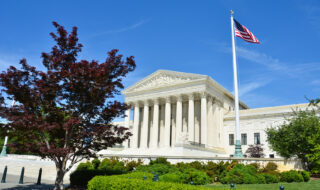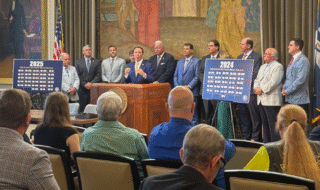Topics:
November 15, 2023
The NFIB Small Business Legal Center filed six amicus briefs for small business cases
NFIB Files Amicus Briefs in Six Small Business Court Cases
Carrera v. E.M.D. Sales
NFIB filed an amicus brief in the case of Carrera v. E.M.D. Sales, asking the U.S. Supreme Court to review a case that would clarify what standard applies for an employer to prove an overtime exemption. The brief argues that a federal appellate court was wrong to impose the higher burden of proof (clear and convincing evidence) on employers to demonstrate an exemption.Allstates Refractory Contractors, LLC v. Walsh
NFIB filed an amicus brief in the case of Allstates Refractory Contractors, LLC v. Walsh at the Sixth Circuit Court of Appeals. The case asks the federal appellate court to consider whether the Occupational Safety and Health Administration’s (OSHA) statutory authority to establish workplace safety standards is an unconstitutional delegation of legislative power. NFIB’s brief argues the OSHA workplace safety standards are unconstitutional and exceed its authority under federal law.Quinn v. State of Washington
NFIB filed an amicus brief in the case of Quinn v. State of Washington asking the U.S. Supreme Court to review a lower court decision that considers whether the Constitution allows states to tax out-of-state transactions involving only out-of-state property. NFIB and partner business groups minced no words about Washington state’s new excise tax, calling it “indefensible” and running “roughshod over our constitutional system’s division of sovereignty among the states.”SEC v. Jarkesy
NFIB filed an amicus brief in the case Securities and Exchange Commission v. George R. Jarkesy, Jr. and Patriot28, LLC at the U.S. Supreme Court. The case considers whether the Securities and Exchange Commission’s (SEC) in-house enforcement proceedings are unconstitutional. “Small businesses depend on consistent and fair enforcement from governing bodies,” said Elizabeth Milito, executive director of the NFIB Small Business Legal Center. “The SEC has been allowed to wield the power of the Executive Branch without proper checks and balances. NFIB is hopeful that the Court will uphold the ruling of the Fifth Circuit Court and enforce the structural limitations of the Constitution.” The brief argues two main points:- The right to a jury trial has been an essential check against government overreach throughout the history of the U.S., and the SEC enforcement proceedings violated the Seventh Amendment.
- The SEC’s enforcement proceedings are furthermore unconstitutional because they are handled by Administrative Law Judges (ALJ) who function as an extension of the Executive Branch yet cannot be directly removed by the President due to multiple layers of tenure protection, which is prohibited by Article II of the Constitution.
Muldrow v. City of St. Louis
NFIB filed an amicus brief in the case Jatonya Clayborn Muldrow v. City of St. Louis, Missouri, et al. at the U.S. Supreme Court. The case questions whether Title VII of the Civil Rights Act of 1964 categorically applies to all transfer decisions, regardless of whether the transfer negatively alters the employee’s compensation, terms, conditions, or privileges of employment. “Now more than ever, small business owners need clear, objective standards that allow them the flexibility to meet their business and staffing needs,” said Milito. “Adopting a subjective, erroneous interpretation of Title VII will put small businesses at risk of costly litigation and liability. NFIB urges the Court to reject the Petitioner’s interpretation of Title VII.” The brief argues three main points:- Title VII only applies to transfer decisions that alter the understood benefits and requirements of an employment relationship as defined in the legislation and by court precedent.
- The Petitioner’s interpretation of Title VII would undermine employers’ abilities to operate their businesses efficiently.
- Since this decision will become a precedent for future Title VII claims, the Court should be mindful not to decide on issues that have not directly been presented in this case.
Camp v. Home Depot USA, Inc.
NFIB filed an amicus brief in the case of Camp v. Home Depot USA, Inc., at the Supreme Court of California. The case questions whether neutral time-rounding is a fair means of calculating California employees’ time worked and subsequently their wages. Neutral timekeeping policies are permitted under federal law and the laws of nearly every state. “Neutral time-rounding has for decades been considered not only the standard policy for timekeeping, but also a fair and beneficial system for employers and workers alike,” said Milito. “Requiring employers to count employee time to the second would place a disproportionate burden on California’s small businesses, many of whom use manual timecards and calculate payroll without the assistance of a service or accountant. With their limited time and resources, this inconsistent standard could be devastating to many small business owners. NFIB urges the Court to reverse the lower court’s decision.” The brief argues two main points:- Federal law permits, and California precedent has upheld, neutral time rounding so long as time is rounded both up and down to reflect an average of time worked.
- Upending this standard would impose substantial costs on the hundreds of thousands of small businesses in California with little evidence that employees would benefit from the Plaintiff’s proposed rule.
State:
Get to know NFIB
NFIB is a member-driven organization advocating on behalf of small and independent businesses nationwide.
Related Articles

June 30, 2025
Small Businesses Pick Up Promising Wins in U.S. Supreme Court�…
The Supreme Court’s 2024-2025 term was a relatively quiet one for small b…
Read More


June 30, 2025
Governor Signs Last of NFIB-Supported Bills to Reduce Insurance…
The measures are aimed at stopping lawsuit abuse.
Read More


June 30, 2025
NFIB California Main Street Minute, June 30-July 4
Governor signs 2024-2025 state budget. NFIB to meet with CARB
Read More


June 27, 2025
NFIB Asks Oregon Court for Clear Interpretation of Wage Transpa…
NFIB filed an amicus brief in the case Ana Mirkovic v. TenAsys Corporation…
Read More







